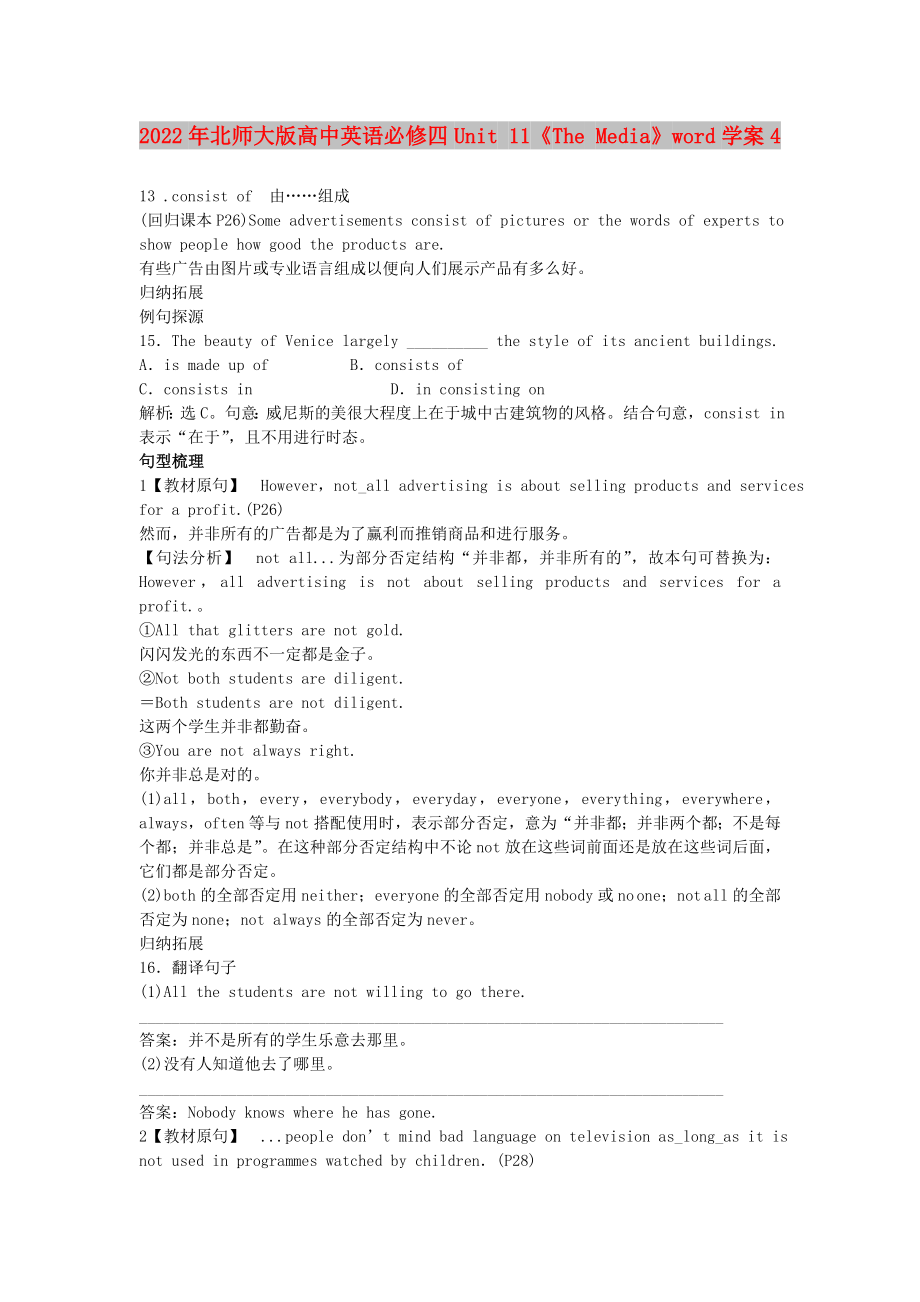《2022年北師大版高中英語(yǔ)必修四Unit 11《The Media》word學(xué)案4》由會(huì)員分享��,可在線(xiàn)閱讀��,更多相關(guān)《2022年北師大版高中英語(yǔ)必修四Unit 11《The Media》word學(xué)案4(2頁(yè)珍藏版)》請(qǐng)?jiān)谘b配圖網(wǎng)上搜索��。
1��、2022年北師大版高中英語(yǔ)必修四Unit 11《The Media》word學(xué)案4
13 .consist of 由……組成
(回歸課本P26)Some advertisements consist of pictures or the words of experts to show people how good the products are.
有些廣告由圖片或?qū)I(yè)語(yǔ)言組成以便向人們展示產(chǎn)品有多么好��。
歸納拓展
例句探源
15.The beauty of Venice largely __________ the style of its ancient buil
2��、dings.
A.is made up of B.consists of
C.consists in D.in consisting on
解析:選C��。句意:威尼斯的美很大程度上在于城中古建筑物的風(fēng)格��。結(jié)合句意��,consist in表示“在于”��,且不用進(jìn)行時(shí)態(tài)��。
句型梳理
1【教材原句】 However��,not_all advertising is about selling products and services for a profit.(P26)
然而��,并非所有的廣告都是為了贏利而推銷(xiāo)商品和進(jìn)行服務(wù)��。
【句法分析】 not all...為
3��、部分否定結(jié)構(gòu)“并非都��,并非所有的”��,故本句可替換為:However��,all advertising is not about selling products and services for a profit.��。
①All that glitters are not gold.
閃閃發(fā)光的東西不一定都是金子��。
②Not both students are diligent.
=Both students are not diligent.
這兩個(gè)學(xué)生并非都勤奮��。
③You are not always right.
你并非總是對(duì)的��。
(1)all��,both,every��,eve
4��、rybody��,everyday��,everyone��,everything��,everywhere��,always��,often等與not搭配使用時(shí)��,表示部分否定��,意為“并非都��;并非兩個(gè)都��;不是每個(gè)都��;并非總是”��。在這種部分否定結(jié)構(gòu)中不論not放在這些詞前面還是放在這些詞后面��,它們都是部分否定��。
(2)both的全部否定用neither��;everyone的全部否定用nobody或no one��;not all的全部否定為none��;not always的全部否定為never��。
歸納拓展
16.翻譯句子
(1)All the students are not willing to go there.
5��、
________________________________________________________________________
答案:并不是所有的學(xué)生樂(lè)意去那里��。
(2)沒(méi)有人知道他去了哪里��。
________________________________________________________________________
答案:Nobody knows where he has gone.
2【教材原句】 ...people don’t mind bad language on television as_long_as it is not use
6��、d in programmes watched by children.(P28)
……電視中的不良語(yǔ)言��,只要不用于兒童節(jié)目,人們并不介意��。
【句法分析】 as/so long as意為“只要”��,用來(lái)引導(dǎo)條件狀語(yǔ)從句��,與so/as long as同義的引導(dǎo)條件狀語(yǔ)從句的連詞還有:on condition that��,provided(that)��,providing(that)��,only if��,if等��。
①As long as you can be back before 10 o’clock��,you can go out.
只要你10點(diǎn)鐘前能回來(lái)��,你可以外出��。
②As long as
7��、you accept our conditions��,we’ll start working immediately.
只要你答應(yīng)我們的條件,我們就立即開(kāi)始工作��。
17.I’ll lend you my bike ________ you promise that you can return it in time.
A.a(chǎn)s far as B.a(chǎn)s soon as
C.a(chǎn)s long as D.a(chǎn)s much as
解析:選C��。很顯然空格內(nèi)要求填入連詞��,引導(dǎo)后面的從句��,且根據(jù)主從句表達(dá)意思的連貫性原則��,從句的連詞應(yīng)表達(dá)“只要”的意思��。
3【教材原句】 “I w
8��、ould have been killed if_I’d_stayed_in_the_truck��,”he said afterwards.(P28
他后來(lái)說(shuō):“如果我留在車(chē)上的話(huà)��,我就會(huì)被撞死了��?�!?
【句法分析】 本句中含有if引導(dǎo)的虛擬條件句��,敘述與過(guò)去事實(shí)相反的假設(shè)��。
①I(mǎi) wouldn’t have blamed my son if I had known the truth.
我要是知道真相就不會(huì)責(zé)備兒子了��。
②If you had followed my advice yesterday��,you would be better now.
如果昨天你聽(tīng)從我的建議��,你現(xiàn)在就會(huì)好多了��。
18.完成句子
(1)If you __________ __________ __________(幫助我)in the exam��,I would have passed it.
答案:had helped me
(2)If you had followed my advice��,you __________ __________ __________ __________(不會(huì)受責(zé)備)by the teacher.
 2022年北師大版高中英語(yǔ)必修四Unit 11《The Media》word學(xué)案4
2022年北師大版高中英語(yǔ)必修四Unit 11《The Media》word學(xué)案4

